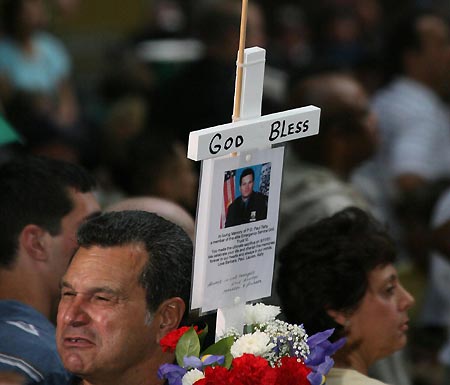The September 11 terror attacks, no matter how much they have shaken up the world, now seem to fade away in the everyday life of most Americans.
As the event approaches its seventh anniversary, there has been no intensive media coverage so far about it by major US newspapers, magazines or TV networks.
 |
|
A citizen holds the photo of a fireman who lost his life in the September 11 attacks at the site of the former twin World Trade Center towers in New York, September 11, 2007. New York citizens Tuesday gathered here in rain to attend the ceremony marking the sixth anniversary of the tragedy.[Xinhua File Photo] |
While most Americans seem to be more obsessed with the urgent tasks in hand: the economic situation, the presidential election and the war in Iraq, for those who lost their loved ones in the unprecedented tragic event on September 11, 2001, they are still struggling between keeping memories alive and facing challenges in reality.
"For me, what happened on that day is still like yesterday but the world has changed so much since then," Patricia DeConte, a retired school teacher from Massachusetts, told Xinhua on Wednesday as she paid tribute to her elder son Gerald, who was killed in the attack on the Pentagon, in the Arlington National Cemetery near Washington D.C.
As a director in the Navy Command Center in the Pentagon, Gerald was organizing the Navy's response to the attacks on the World Trade Center in New York, which happened earlier that day, when a passenger jetliner hijacked by terrorists hit the southwest side of the building in Washington.
He died at the age of 44, with 183 others, including 59 passengers on the plane and 125 in the Pentagon.
On the weekend before September 11, 2001, Gerald and his mother had had dinner together.
DeConte said she still remembered what they ate that night: clam chowder, sausage and flank steaks.
Gerald loved to drive an old jeep with a funny license plate: FISH79, she said.
"Fish" was his nickname and 1979 was the year he graduated from the Naval Academy.
"You saw that coming and you knew it was him," DeConte recalled.
She was still very sad after all these years. "It can never be healed," she said.
But DeConte said she gradually realized that she had to face the reality.
"We are so lucky we had that weekend all together," she added.
For Allen Cranford, whose brother Eric was killed in the attack on Pentagon, there wasn't much sorrow on his face.
"There's not a single day that I didn't remember him," said the computer technician from South Carolina.
"But life is going on. And when I stand here today, I don't feel sad or angry. It's just a feeling of peace," said Cranford.
Allen was a member of the Navy staff, and he was 32 when he was killed.
Cranford said he didn't know whether he had fully recovered from the loss of his elder brother.
"But what I can tell you is that my life and the country have changed since 9/11," he said.
For a woman who only gave her first name as Susan, she was lucky to be out of the office when the plane hit the Pentagon. But most people in her office were not.
She lost many colleagues and friends, who were buried in the Section 64 of the cemetery.
Susan said the impact of 9/11 attacks matched that of the attack on Pearl Harbor in 1941.
"The world has changed. We have two wars and we have terror threats every minute. But I don't know what it means for our country," she said.
The tough side of telling the story of 9/11 was to make the country's next generation understand what had happened that day, Susan said.
Her son was still very young at the time of 9/11, and she had to explain to him why there was suddenly heavy security everywhere and why life was so different after that.
About 3,000 people were killed on September 11, 2001, when terrorists carried out attacks with hijacked passenger planes in New York, Washington and Pennsylvania.
(Xinhua News Agency September 11, 2008)